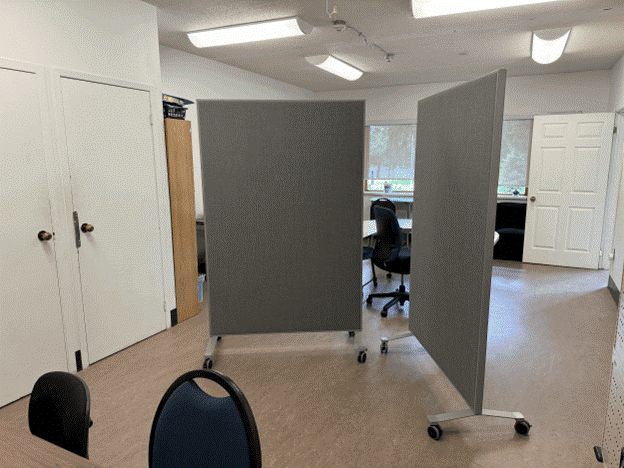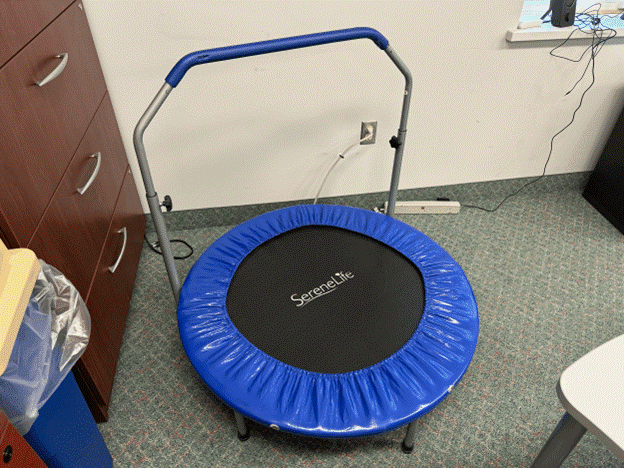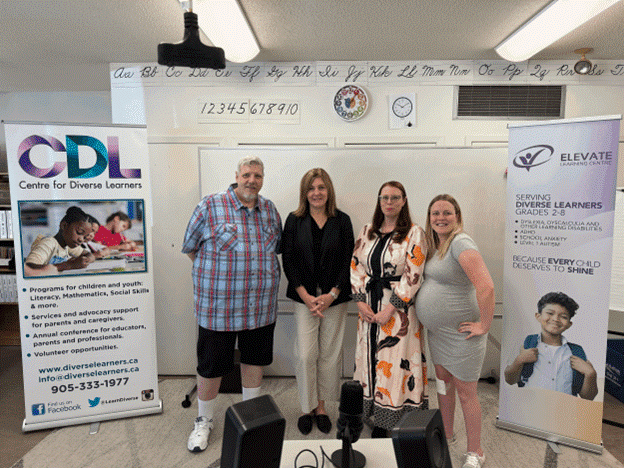By Jack Brittle, Local Journalism Initiative Reporter
On June 28, the Centre for Diverse Learners (CDL) hosted an event with Burlington MPP Natalie Pierre to celebrate a grant from the Ontario Trillium Foundation (OTF) for $38,400 that was given to them in January. The grant allowed CDL to make their learning space more accessible for all diverse learners; this event was meant to showcase all the investments that CDL has made with the grant money.
Carolyn Rankin-Boutin, executive director of CDL, gave Pierre a tour of the organization’s facility, located at 560 Guelph Line.
Rankin-Boutin highlighted some of the new equipment CDL has been able to purchase thanks to the grant, including tables with whiteboards on the surface, wall dividers, easily movable desks, and a small trampoline.
Rankin-Boutin spoke about how this infrastructure helps neurodiverse students learn better.
“When we’re working with the neurodiverse community, they’re often so afraid to make mistakes and they don’t want something they write down to be wrong,” Rankin-Boutin said. “But if we just write it on the whiteboard, that’s going to make them more confident to take those chances and make those mistakes because it’s gone in an instant rather than it being on paper and feeling that sense of permanence.”
She also explained the purpose of the dividers.
“When students need a moment or they need their own space from something, we can move these anywhere so that a student has a space to breathe,” Rankin-Boutin said. “We also teach our students how to advocate for needing that space because a big part of our programs is preparing them to be more successful in the school system.”

“And a big thing is instead of having a meltdown, what can you do before that happens,” she continued. “What can you communicate? And so by receiving those accommodations, they learn what to ask for, because sometimes the seven-year-old doesn’t know ‘I need a moment.’ But we teach them how to say, ‘I need a moment.’”
Rankin-Boutin said the grant money was also utilized to transform the downstairs space of their building into a quiet area for some students with Autism Spectrum Disorder (ASD). She said that before the area was created, CDL had to decline some students who would have not worked well in the louder environment upstairs, which they share with another community group.
“We were able to effectively double the amount of students we could see in person,” Rankin-Boutin said.
She also explained how the organization’s name and branding changed during the pandemic.
“We used to be the Learning Disability Association of Halton/Hamilton,” Rankin-Boutin said. “Then, over COVID, we looked at our community and looked at some of the changes that needed to be made. And one of the things that became really apparent to us was that certain members of our community have very valid concerns about labelling their child as being learning disabled.”
“And our name had a stigma for some of our users, and we want our services to be available to anyone,” she continued. “When we talk about the neurodiverse community, we mean that in the most open sense possible. We’re not gatekeepers. We don’t require a diagnosis to use our services. If a parent or a child feels they are neurodiverse, that’s really our standard.”
Rankin-Boutin also spoke about what being a “client-directed” organization means to the CDL.
“When we are making decisions, even about furniture purchase, we’re talking with our community,” she said. “‘What works for you? What do you need?’ So that it’s never a top-down approach of us believing what our participants need. It’s talking with the parents, talking with the students, and making sure that we are creating an accessible space. It’s not our view of what’s accessible, it’s what is accessible for the community and how they feel.”
Rankin-Boutin said that often, by making classrooms more accessible for neurodiverse students, neurotypical students will benefit as well.
“Our philosophy for education is that what works for the neurodiverse community works for the neurotypical community as well,” she said. “The analogy I would use is, it’s like having a ramp versus a staircase. Everyone can use a ramp, but only some people can use a staircase.”
She also referenced the standing desks that are located on the top floor of their building, and said that while they benefit students with ADHD or ASD, some neurotypical students simply prefer to work standing up as well.

Rankin-Boutin spoke about how, when given the proper accommodations, neurodiverse students can succeed and beat the statistics.
Pierre spoke about the CDL in the press release for the event.
“The Centre for Diverse Learners is a leader in transforming the lives of neurodiverse learners,” Pierre said. “Through the provincial government’s OTF capital stream, the Centre for Diverse Learners has been able to increase their functional space to better serve the community with new technology, accessible equipment and furnishings to help their students thrive.”
“We know that neurodiverse individuals are often underemployed or unemployed completely, that 36% of students with a learning disability will not graduate high school,” she said.
“And then the flip side of that,” she continued, “is we know that when given the supports, they can achieve employment at the right level and that they can graduate from high school and be successful.”





